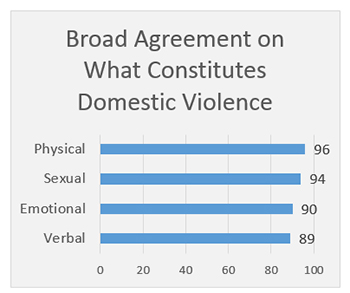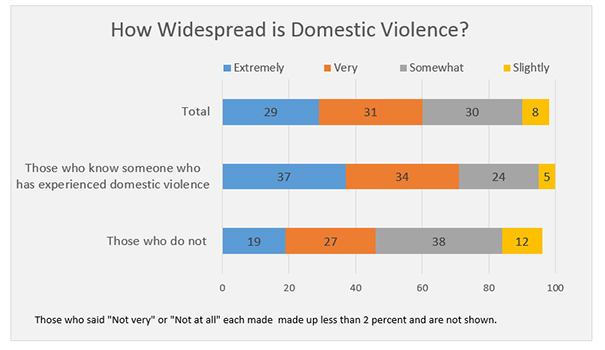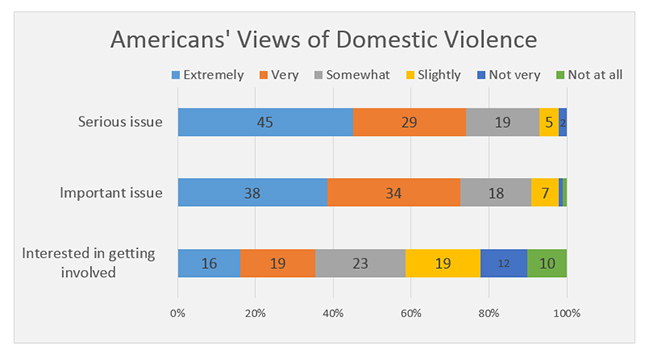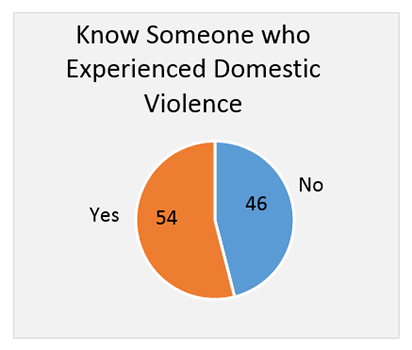Domestic Violence: More than Physical Abuse
2/3/2016
The new Fishlinger Center for Public Policy Research at the College of Mount Saint Vincent seeks to foster meaningful dialog on key public policy issues through independent, objective public opinion research. This initial survey focuses on social issues in the United States.
This is the fourth report from the survey; the earlier reports concentrated on human trafficking, the lack of affordable health care and root causes of poverty. Additional reports on other social problems covered in the survey will be released in the coming months.
About three-quarters of Americans regard domestic violence to be a serious problem in the United States, and 60 percent consider the problem to be widespread. Large majorities agree that domestic violence is more than just physical and includes sexual, verbal and psychological as well
The poll was conducted online May 14 to 26 with 1,253 adults. Field work was conducted by IPSOS Public Affairs. Blacks, Hispanics and Asians were sampled at a higher rate than their proportion of the population for reasons of analysis.
 The Department of Justice defines domestic violence is a pattern of abusive behavior in any relationship that is used to maintain power and control over someone else. Domestic violence is physical, sexual, psychological or emotional abuse against a current or former romantic partner, an immediate family member or another relative.
The Department of Justice defines domestic violence is a pattern of abusive behavior in any relationship that is used to maintain power and control over someone else. Domestic violence is physical, sexual, psychological or emotional abuse against a current or former romantic partner, an immediate family member or another relative.
More than 8 in 10 Americans agree that physical, sexual, emotional and verbal abuse are all included in domestic violence.
Sixty percent of Americans describe domestic violence as an extremely or very pervasive problem in the United States. There is little difference among demographic groups, although those who say they know a victim of domestic violence are much more inclined to regard the problem as widespread.
 Importance of the Issue
Importance of the Issue
The rate of domestic violence has dropped significantly over the past decade, according to the Department of Justice, but the issue remains crucial. The intense news coverage when professional athletes and entertainment celebrities are arrested and charged with abuse can serve to inform the public of domestic abuse and its dangers.
Three-quarters of the public describe domestic violence as an extremely or very serious issue in the United States and about the same number consider it to be extremely or very important.
Nearly a quarter of the public says domestic violence is not being addressed very well or at all. However, while 35 percent of the public say they are extremely or very interested in helping to reach a solution for domestic violence in the United States, only about a quarter say they actually have personally tried to help deal with the problem. 
Familiarity with Domestic Violence
Most Americans know someone who has experienced domestic violence. There is no substantial difference between the percent of men and percent of women who report knowing a victim of domestic violence, or among different racial groups. Younger Americans are more likely to say they know someone who has suffered domestic violence. But that may be due to more awareness of the subject and more willing to discuss it.
At the same time, less than 4 in 10 say they know a lot about the subject. Nearly half of Americans under 30 say they have extensive or quite of bit of knowledge of domestic violence, while fewer older Americans say they are familiar with the problem. The increased knowledge among younger Americans could be due to recent efforts by the Department of Justice years to reduce domestic violence on college campuses.
Despite progress in bringing attention to the issue, many cases of domestic violence go unreported to authorities. According to the Bureau of Justice Statistics, only about 60 percent of physical violence within families is reported to the police. 
Survey Methodology
The fieldwork for the Fishlinger Center poll was conducted by Ipsos Public Affairs. Online interviews with 1,253 adults were collected May 14 to 26, 2015. Sampling for the survey used a blended approach, combining the Ipsos iSay panel with Ampario sample (a blend of external panel and non-panel sources). Ipsos measures the precision of its online surveys using a credibility interval to measure sampling error. The survey of 1,253 respondents has a credibility interval of plus or minus 2.8 percentage points. The credibility interval may be larger for subgroups. The poll is subject to other potential sources of error, including, but not limited to coverage and measurement error. Data were weighted to match the national population on age, sex, Hispanic origin and race. For purposes of analysis, black, Hispanic and Asian respondents were oversampled. These groups were then weighted down to their proper proportion of the population.
About the Fishlinger Center for Public Policy
The Fishlinger Center for Public Policy Research opened in February 2015 at the College of Mount Saint Vincent. The Center, a member of the American Association for Public Opinion Research (AAPOR), conducts deep and broad studies of public opinion on key public policy concerns through independent and objective research conducted by students, faculty, and other members of the academic community.
By providing a forum for discourse that can stimulate intelligent dialog about issues that deeply affect all Americans, the Center illustrates and enhances the relationship between the work of the College and the common good.
About the College of Mount Saint Vincent
Founded in 1847 by the Sisters of Charity, the College of Mount Saint Vincent offers nationally recognized liberal arts education and a select array of professional fields of study on a landmark campus overlooking the Hudson River. Committed to the education of the whole person, and enriched by the unparalleled cultural, educational and career opportunities of New York City, the College equips students with the knowledge, skills and experiences necessary for lives of achievement, professional accomplishment and leadership in the 21st century.
